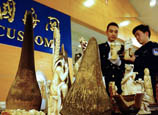
LANZHOU, March 22 (Xinhua) -- Zoo authorities in Lanzhou, capital of northwest China's Gansu Province, have pled innocence after photos of a dirty, skinny giant panda prompted public concerns that the animal might have been mistreated.
"Such suspicions are groundless," said Lei Qinghai, head of the Lanzhou Zoo, which is the home of "Lanzai," the giant panda at the center of the controversy.
"Lanzai is not mistreated here. We've done everything we can to ensure the panda's health and comfort," Lei said.
The panda appeared to be in poor condition in a photo posted on Sina Weibo, the Chinese equivalent of Twitter, on Wednesday.
The panda in the photo appeared sullen and unhealthy and its white fur appeared brown and filthy.
"It is probably the most miserable panda in the world," said web user "gebuyiban3285043987," who posted the photo Wednesday night.
Pandas are always kept in air-conditioned pens and nursed with extra care at zoos worldwide.
The post called for other web users to help protect the endangered animal and if necessary, raise funds for the zoo to ensure adequate food and supplies.
More than 50,000 netizens reposted the photo alongside sympathetic comments and verbal attacks targeting zoo authorities. "If the Lanzhou Zoo cannot afford to raise a panda, why don't they send it away to a big city like Beijing or Shanghai?" wrote netizen "Mengliyouxia."
Lei said Lanzai did not appear as healthy as other pandas because of dusty weather conditions that stained its fur last week.
"Actually, all our facilities are covered by a thick layer of dust," said Lei. "But we cannot bathe it too often because it might catch a cold."
He said the zoo built the best possible panda enclosure it could afford, with glass walls surrounding a playground with stonework, a jungle gym and a pond.
The zoo's panda enclosure covers about 500 square meters, with two separate pens for Lanzai and Lanbao, two male pandas born to a pair of pandas in Chengdu, capital of southwest China's Sichuan Province.
Lanzai, born in October 2004, weighs 110 kg, above average for adult pandas, said Lei.
Lanbao, born in August 2002, has been in poor health and is recuperating in Chengdu.
The zoo's panda keeper Zhang Yuhong said the two pandas arrived at the Lanzhou Zoo in 2006 but spent many years adapting to the environment and new food sources.
"We ordered bamboo from different suppliers in Gansu, Shaanxi and Ningxia before we found that their favorite bamboo comes from central Henan Province," said Zhang.
Besides bamboo and bamboo shoots, the pandas are also fed bread, carrots and apples.
Zhang said the cost of keeping a giant panda totals 70,000 yuan (11,267 U.S. dollars) a year. "The zoo can well afford the costs," he said.
In August 2007, Lanzai attacked its keeper and seriously injured him. Vets said the animal was upset because it was uncomfortable after undergoing a major habitat change.
Even after seven years in Lanzhou, the pandas are still trying to adapt to the city's arid environment. A man surnamed Shi who visits the zoo regularly said Lanzai appears to be thinner than before.
Although zoo authorities have insisted that the zoo is experienced and competent enough to raise the pandas, some people are concerned that trying to keep the vulnerable animals in a vastly different environment may not be wise.
"The act of locking up pandas behind glass walls for public entertainment runs counter to zoologists' efforts to preserve the species," said Professor Liu Naifa from Lanzhou University's School of Life Sciences.
Panda researchers have said that about one-third of China's pandas are not effectively protected as a result of natural disasters, climate change and human activity.
As of the end of last year, 341 giant pandas were being kept in captivity in zoos around the world. The population of pandas in the wild is estimated to be around 1,600.
















 Migrant families must leave as container 'village' unlawful
Migrant families must leave as container 'village' unlawful


![]()
